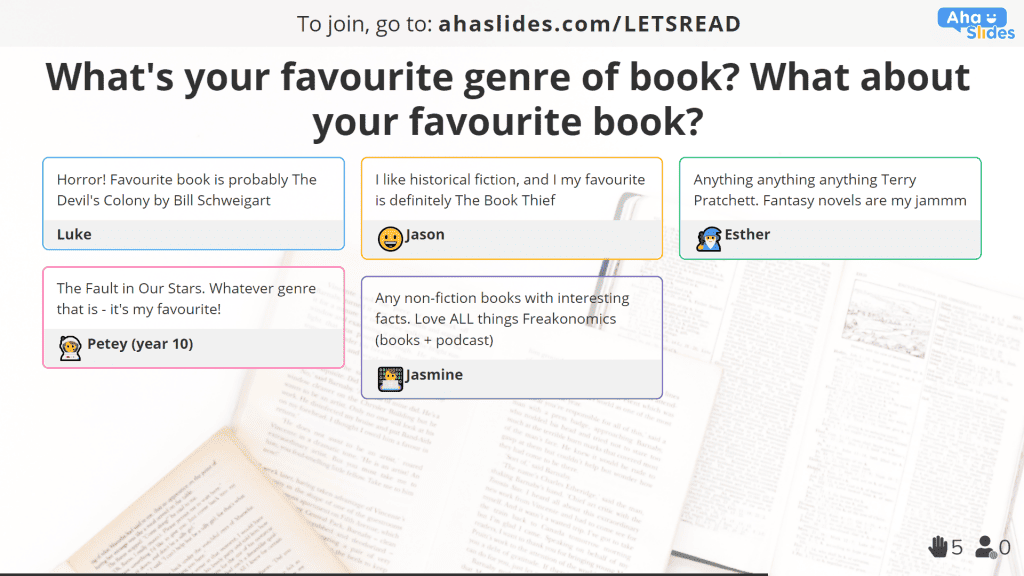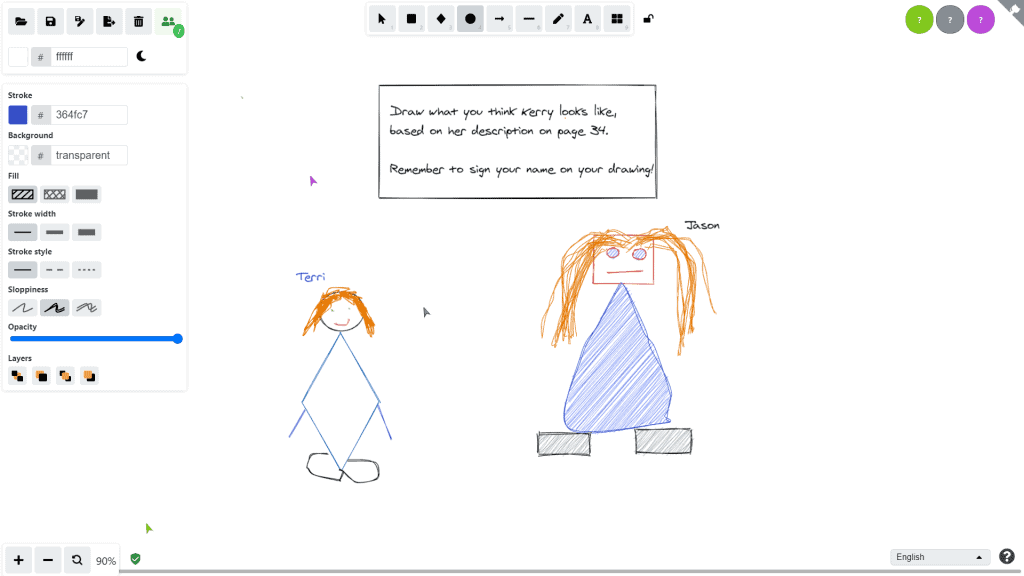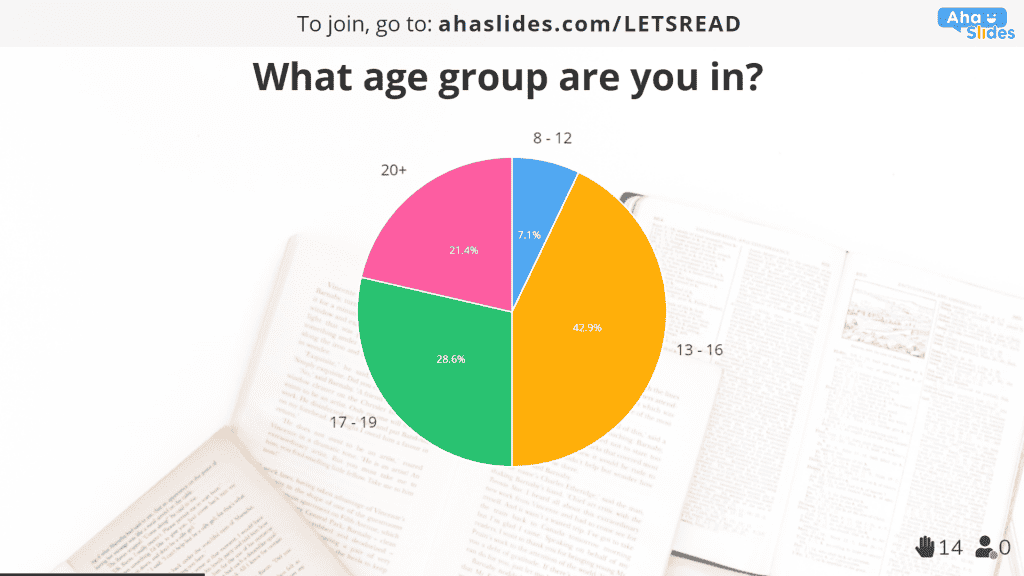Ah, the humble school book club - remember that from the old days?
Keeping students in touch with books in the modern world is not easy. But, an engaging virtual literature circle could be the answer.
At AhaSlides, we've been helping teachers go remote for a good few years now. For the hundreds of thousands of teachers who use our software, and the many more who don't, here's our 5 reasons and 5 steps to start a virtual book club...
Your Guide to School Book Clubs
- 5 Reasons to Start a School Book Club
- How to Start a School Book Club in 5 Steps
- What's Next for your School Book Club?
5 Reasons to Start a School Book Club
#1: Remote-Friendly
Book clubs in general have been one of the many offline activities to migrate online recently. You can see why, right?
School book clubs fit so neatly into the online sphere. They involve reading, debate, Q&A, quizzes - all activities that work great over Zoom and other interactive software.
Here are some examples of software you can use to get the most out of your club meetings:
- Zoom - video conferencing software to host your virtual school book club.
- AhaSlides - free, interactive presentation software to facilitate live discussion, idea exchange, polls and quizzes about the material.
- Excalidraw - a virtual + free communal whiteboard that allows readers to illustrate their points (see how it works down here)
- Facebook/Reddit - any social forum where teachers and students can link to material like author interviews, press releases, etc.
In fact, there's a point to be made for these activities working better online. They keep everything organised, efficient and paperless, and most of them do it for free!

#2: The Perfect Age Group
As adult book lovers (by which we mean adults who love books!) we often wish we had school book clubs or literature circles at school.
A virtual school book club is a gift that you can give to book enthusiasts during their formative years. They're at the perfect age to have their horizons widened; so be bold with your book choices!
#3: Employable Skills
From reading to discussing to working together, there's no part of a school literature circle that doesn't develop future skills that employers love. Even the snack break can be useful for future competitive eaters!
Workplace book clubs are also on the rise for the exact same reason. Eyewear company Warby Parker have no less than eleven book clubs within their offices, and co-founder Neil Blumenthal claims that each one "spurs creativity" and offers "inherent lessons" for his staff.
#4: Personal Attributes
Here's the real scoop - book clubs are not just good for skills, they're good for people.
They're fantastic for developing empathy, listening, logical thinking and confidence. They teach students how to have a constructive debate and show them that they should never fear changing their mind on a matter.
#5: ...Something to do?
Honestly, at this point, we're all just looking for something to do together. The inability for many live activities to migrate online means that there's probably no point in history in which kids are more excited to engage in book-related ventures!
How to Start a School Book Club in 5 Steps
Step 1: Decide on your Target Readers
The very foundation of al book club isn't the technology you use, or even the books you read. It's the readers themselves.
Having a solid idea about the participants of your book club is what sets up all the other decisions you make. It affects the book list, the structure, the pace and the questions you ask your readers.
Here's a few questions to consider in this step:
- What age group should I aim this book club at?
- What level of reading experience should I expect of my readers?
- Should I have seperate meetings for fast readers and slow readers?
If you don't know the answer to these questions, you can get them with a pre-club online survey.
Simply ask your potential readers about their age, reading experience, speed and whatever else you want to know. This way, you can also ask them what kinds of books they want to read, if they have any initial suggestions and the sorts of activities they like when reviewing books.
Once you have the data, you can start crafting your school book club around the majority of those interested in joining.
👊 Protip: You can download and use this survey for completely free on AhaSlides! Just click the button and share the room code with your students for them to fill out the survey on their smartphones.
Step 2: Choose your Book List
With a better idea of your readers, you'll be much more confident about picking the books you're all going to read together.
Again, a pre-club survey is a great opportunity to learn exactly what kind of books your readers are into. Ask them directly about their favourite genre and favourite book, then note down your findings from the answers.

Remember, you're not going to please everyone. It's hard enough getting everyone to agree on a book at a normal book club, but a school book club online is a whole different beast. You're going to have some reluctant readers who didn't realise that a school book club is often about reading material outside their comfort zone.
Check out these tips:
- Start out with some fairly easy books to test the water.
- Throw in a curve ball! Choose 1 or 2 books that you think no one has heard of.
- If you have reluctant readers, offer them a choice of 3 to 5 books and let them vote for their favourite.
⭐ Need help? Check out Goodread's 2000-strong list of teen book club books.
Step 3: Establish the Structure (+ Pick your Activities)
In this step, you've got 2 main questions to ask yourself:
1. What's the overall structure of my club?
- How often the club will meet together online.
- The specific date and time of the meeting.
- How long each meeting should last.
- Whether readers should read the whole book, or meet together after every 5 chapters, for example.
2. What's the inner structure of my club?
- How long you want to discuss the book for.
- Whether you want to get your readers to do live readings over Zoom.
- Whether or not you want to have practical activities outside of discussion.
- How long each activity will last.
Here are some great activities for a school book club...

- Drawing - Student readers of any age usually love to draw. If your readers are younger, you can task them to draw a few characters based on their descriptions. If your readers are older, you can encourage them to draw something more conceptual, like a plot point or relationship between two characters.
- Acting - Even with an online literature circle, there's so much room for getting active. You can put groups of readers into digital breakout rooms and give them a part of the plot to act out. Give them a decent amount of time to plan their performance, then bring them back to the main room to show it off!
- Quizzing - Always a favourite! Make a short quiz about what happened in the latest chapters and test your readers' memory and understanding.
👊 Protip: AhaSlides lets you create free, engaging quizzes to play live with your readers. You present the questions over Zoom screen share, they respond in real-time on their smartphones.
Step 4: Set out your Questions (Free Template)
Activities like drawing, acting and quizzing might be great for spurring engagement, but at the heart of it, you want your book club to be about discussion and idea exchange.
Undoubtedly, the best way to facilitate that is to have a great bunch of questions to ask your readers. These questions can (and should) take many different forms, including opinion polls, open-ended questions, scale ratings and so on.
The questions you ask should depend on your target readers, but some great ones include:
- Did you like the book?
- Who do you relate to the most in the book, and why?
- How would you rate the plot, the characters and the writing style in the book?
- Which character changed the most throughout the book? How did they change?
We've actually compiled some great questions into this free, interactive template on AhaSlides.
- Click the button above to see the school book club questions.
- Add or change anything you want about the questions.
- Either present the questions to your readers live by sharing room code, or give them the questions for them to fill out on their own!
Not only does using interactive software like this make school book clubs more fun for young readers, but it also keeps everything more organised and more visual. Each reader can write their own responses to each question, then have small group or large scale discussions over those responses.
Step 5: Let's Read!
With all the preparations made, you're ready for the first session of your school book club!

Here's a few tips to ensure everything runs smoothly:
- Set the rules - Especially with younger students, virtual literature circles can quickly descend into anarchy. Lay down the law from the very first meeting. Talk them through each activity, how they will work and how the software you're using helps them to keep the discussions orderly.
- Get high attaining students involved - Chances are that the most avid readers in your book club will be the most excited for it to kick off. You can make the most of this enthusiasm by asking these students to lead some of the discussion and activities. Not only does this equip them with some great leadership skills for the future, but it's likely to engage the readers who still see you as a 'teacher', and are therefore shy to voice opinions in front of you.
- Use some virtual ice breakers - At the very first book club, it's pretty much essential to get readers familiar with each other. Engaging in some virtual ice breakers can loosen up the shy students and make them more likely to share their thoughts in the session ahead.
⭐ Need inspiration? We've got a list of ice breakers for any situation!
What's Next for your School Book Club?
If you've got the drive, now's the time to recruit your readers. Spread the word and ask them what they want from your new book club.
Click the buttons below for this set of totally free, interactive questions for your readers. Preview and download the in-club discussion questions.
Happy reading!









